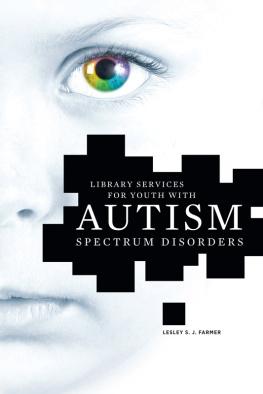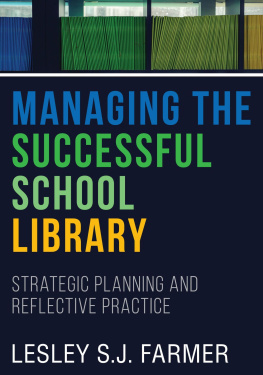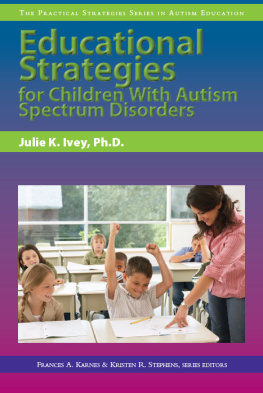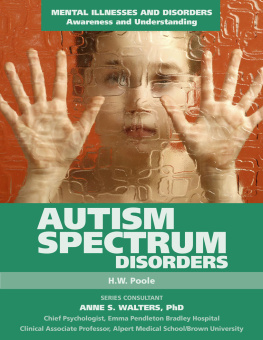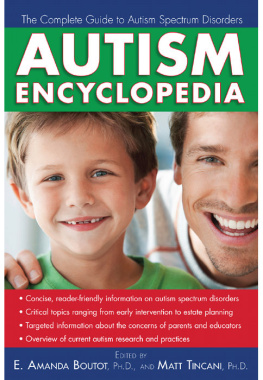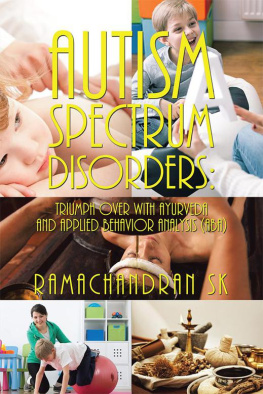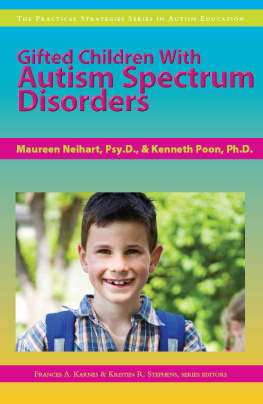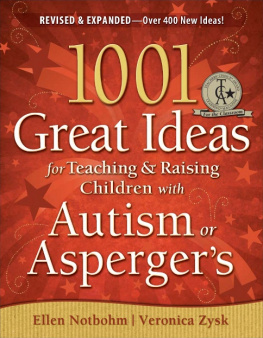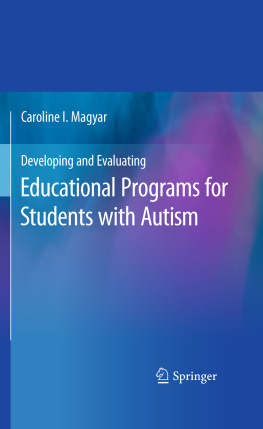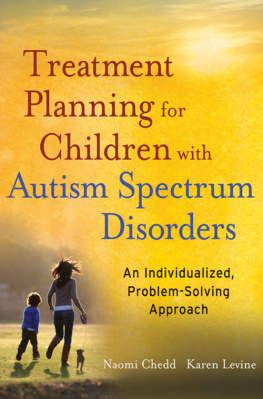Lesley S. J. Farmer - Library Services for Youth with Autism Spectrum Disorders
Here you can read online Lesley S. J. Farmer - Library Services for Youth with Autism Spectrum Disorders full text of the book (entire story) in english for free. Download pdf and epub, get meaning, cover and reviews about this ebook. year: 2013, publisher: American Library Association, genre: Home and family. Description of the work, (preface) as well as reviews are available. Best literature library LitArk.com created for fans of good reading and offers a wide selection of genres:
Romance novel
Science fiction
Adventure
Detective
Science
History
Home and family
Prose
Art
Politics
Computer
Non-fiction
Religion
Business
Children
Humor
Choose a favorite category and find really read worthwhile books. Enjoy immersion in the world of imagination, feel the emotions of the characters or learn something new for yourself, make an fascinating discovery.
- Book:Library Services for Youth with Autism Spectrum Disorders
- Author:
- Publisher:American Library Association
- Genre:
- Year:2013
- Rating:5 / 5
- Favourites:Add to favourites
- Your mark:
- 100
- 1
- 2
- 3
- 4
- 5
Library Services for Youth with Autism Spectrum Disorders: summary, description and annotation
We offer to read an annotation, description, summary or preface (depends on what the author of the book "Library Services for Youth with Autism Spectrum Disorders" wrote himself). If you haven't found the necessary information about the book — write in the comments, we will try to find it.
Library Services for Youth with Autism Spectrum Disorders — read online for free the complete book (whole text) full work
Below is the text of the book, divided by pages. System saving the place of the last page read, allows you to conveniently read the book "Library Services for Youth with Autism Spectrum Disorders" online for free, without having to search again every time where you left off. Put a bookmark, and you can go to the page where you finished reading at any time.
Font size:
Interval:
Bookmark:
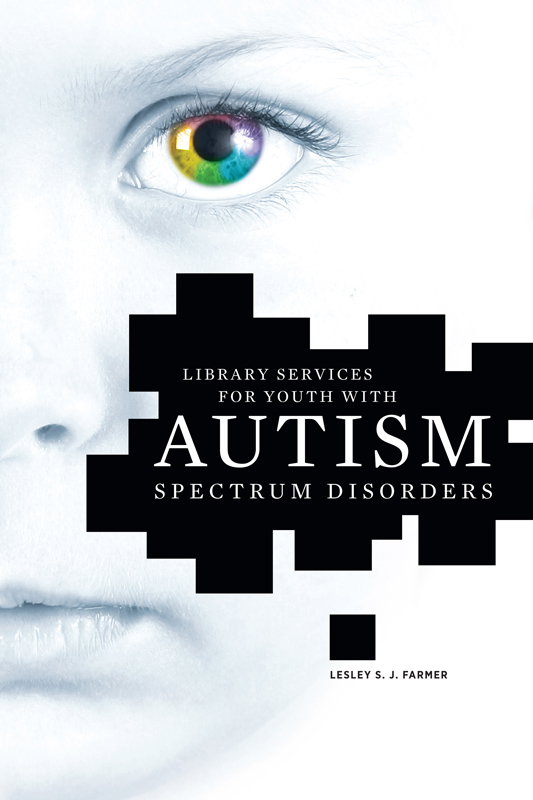
ALA Editions purchases fund advocacy, awareness, and accreditation programs for library professionals worldwide.
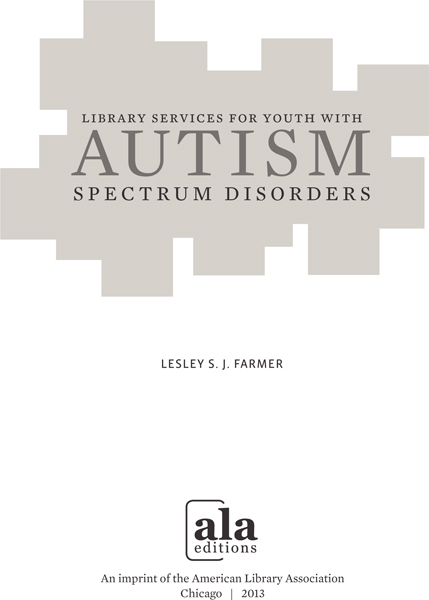
Dr. Lesley Farmer, professor at California State University, Long Beach (CSULB), coordinates the Librarianship Program. She earned her MS in library science at the University of North Carolina, Chapel Hill, and received her doctorate in adult education from Temple University. Farmer has worked as a librarian in K12 school settings, as well as in public, special, and academic libraries. She is incoming chair of the Education Section of the Special Libraries Association, and she is the International Association of School Librarianships vice president of association relations. Farmer is a Fulbright Scholar and has received the Distinguished Scholarly Activity Award from CSULB, several professional association awards, and national and international grants. Farmers research interests include information literacy, assessment, collaboration, and educational technology. A frequent presenter and writer for the profession, Farmer has published two dozen professional books and more than a hundred professional book chapters and articles.
2013 by the American Library Association. Any claim of copyright is subject to applicable limitations and exceptions, such as rights of fair use and library copying pursuant to Sections 107 and 108 of the U.S. Copyright Act. No copyright is claimed for content in the public domain, such as works of the U.S. government.
Extensive effort has gone into ensuring the reliability of the information in this book; however, the publisher makes no warranty, express or implied, with respect to the material contained herein.
ISBNs: 978-0-8389-1181-5 (paper); 978-0-8389-9472-6 (PDF); 978-0-8389-9473-3 (ePub); 978-0-8389-9474-0 (Kindle). For more information on digital formats, visit the ALA Store at alastore.ala.org and select eEditions.
Library of Congress Cataloging-in-Publication Data
Farmer, Lesley S. J.
Library services for youth with autism spectrum disorders / Dr. Lesley S.J. Farmer.
pages cm
Includes .
ISBN 978-0-8389-1181-5
1. Libraries and children with disabilities. 2. Autism spectrum disorders in children. 3. Children with autism spectrum disordersBooks and reading. I. Title.
Z711.92.H3F37 2013
027.6'63dc23 2012027514
Cover image Vanessa Nel/Shutterstock, Inc.
To Maureen Sykes, who inspired me to write this book and helped make it a reality
Contents
Developmental Characteristics of Youth with ASDs
T he term autism spectrum disorders (ASDs) refers to five pervasive developmental disorders: autistic disorder, Aspergers syndrome, Rett syndrome, childhood disintegrative disorder (CDD), and pervasive development disorder not otherwise specified (PDD-NOS). Sometimes these disorders are categorized as spectrum disorders because the symptoms can range from mild to extreme; spectrum disorders are defined by linked subgroups of conditions rather than by a single characteristic. Because ASDs manifest in so many different ways, it is difficult to ascribe blanket characteristics to these children. A popular adage among people who work with youth with ASDs is If you know one child with autism, you know one child with autism. Nevertheless, some aspects of these developmental disorders may be examined with confidence: sensory processing, communication, social interaction, and certain persistent patterns of behavior. Another important consideration is the developmental aspects of children of ASDs; they are growing individuals first of all. Furthermore, parental belief systems about lifestyles and treatment options can influence how parents treat their autistic children and interact with educational personnel.
Research into autism is ongoing, changing the face and scope of the disorder and the interventional treatments that ameliorate its symptoms. But it helps to have a solid understanding of the range of characteristics and behaviors of youth with ASDs in light of developmental issues.
ASDs as They Play Out in Daily Life
So how do characteristics of ASDs play out in the lives of youth with these disorders? Because these youth may react quite unusually to stimuli, they may exhibit particularly repetitive behaviors, which are their mechanisms for dealing with stimuli. Some children have difficulty controlling their behaviors within a high-stimulus situation; not surprisingly, most children with autism prefer predictable routines and environments. The online community Wrongplanet.net offers high-functioning youth with ASDs an opportunity to explore and share their feelings about the hardships of daily life:
I am minding my own business, when my older brother nags me to go into his room and watch a video on his laptop, I hate being interrupted when [I] am doing something. But he then shows me these videos that he liked, or thought were funny, that I think are dumb, or boring. [And now] I am forced to use fake-emotions, and to hold my ever growing urge to tell him what I really think about the videos.... I am just going to stuff my head in my pillow and SCREAM!!!!! (iceveela, www.wrongplanet.net/postt172820.html, August 27, 2011)
Furthermore, what may be routine for some, such as playing ball, sometimes requires explicit attention and step-by-step concentration for children with ASDs. They may have difficulty imagining the perspective of another person. It should be noted that empathy is very present in autistics; it just presents itself differently. The following blog post by a young woman with ASD also underlines the potential role of libraries to work with these youth:
Now that I have the ability to recognize my difficulties and the tools to fix them, I am far more socially competent than I ever was before learning about autism. I used to be the stereotypical awkward misfit, never wearing the right clothes or acting the right way. I had no idea how to comfort a crying friend, or how to maintain a romantic relationship. I had no idea that there were people (and books) that could teach me, or that I was capable of learning! (Lindsmith, www.wrongplanet.net/article407.html, August 2, 2011)
Children with ASDs may seem to prefer to be alone, as they tend not to express easy-to-interpret feelings of affection; for instance, they may play side by side rather than interactively, which is their method of socialization. A commenter at wrongplanet.net noted:
My passion had always been art, and drawing taught me to read faces. I analyzed the muscle structure of the human face, and which places were contracted or relaxed in different moods. I was also pretty into anime and manga, which place a heavy emphasis on facial expressions. I feel sort of lame admitting it, but a lot of what I learned about non-verbal language came from my consumption of Japanese media as a teenager. The down side was the anime faces I started to imitate, thinking they were natural (Lindsmith, www.wrongplanet.net/article409.html, August 17, 2011)
Children with ASDs are usually developmentally impaired with respect to speech development, although some children may communicate well in other ways, such as by creating images or typing. Some youth may feel that their minds are running a mile a minute, too fast to articulate their ideas clearly; their thoughts outrun their words. To these youth, there seems to be a disconnect between their senses and their circumstances:
I am me is disconnected.... Even saying it now creates a feeling of disconnection. I hide behind something fake, this much I know is true. If I search inside for the me I know must exist somewhere[,] I cant reach it. I dont know what Im looking for, so often I just feel numb. (Kiana, www.wrongplanet.net/modules.php?name=blogview&user=Kiana, August 25, 2011)
Next pageFont size:
Interval:
Bookmark:
Similar books «Library Services for Youth with Autism Spectrum Disorders»
Look at similar books to Library Services for Youth with Autism Spectrum Disorders. We have selected literature similar in name and meaning in the hope of providing readers with more options to find new, interesting, not yet read works.
Discussion, reviews of the book Library Services for Youth with Autism Spectrum Disorders and just readers' own opinions. Leave your comments, write what you think about the work, its meaning or the main characters. Specify what exactly you liked and what you didn't like, and why you think so.

